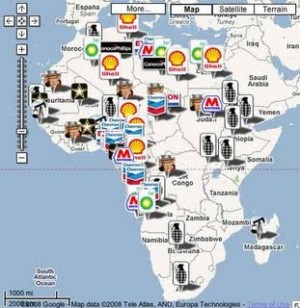Oil and democracy: do they mix?
A few days ago in his FiveThirtyEight blog, Nate Silver considered Egypt, Oil and Democracy:
There is a large body of literature in political science connecting oil wealth and democratization. Although the conclusions are not universally accepted and there are some exceptions — Norway, for instance, is one of the most petroleum-rich countries in the world, and also one of the most democratic — the consensus view is toward what Thomas L. Friedman refers to as The First Law of Petropolitics: oil and democracy do not mix.
He then pointed to data from 21 Middle Eastern and North African countries, which showed an inverse relationship between democracy and resource wealth. In other words, the more oil a country has, the less likely it is to be democratic. He added:
Many of the studies that have identified this effect have concluded that it is not necessarily confined to the Middle East — some evidence also been cited in Africa, for instance, as well as the countries of the former Soviet Union. And many have also concluded that the effects are not merely incidental but, also, causal: when new oil discoveries are made, they tend to retard democratization and enhance authoritarianism (a recent example of this is Equatorial Guinea, which discovered significant amounts of oil in the late 1990s).
What does this have to do with Egypt, you ask? Well, he goes on to write that both Tunisia and Egypt — with relatively little oil wealth — have better chances at democratization than some of the other countries in the region. Fine, except that following that logic, Tunisia and Egypt should already be among the more democratic of the 22 countries cited. Unfortunately, though, they faced another impediment to democracy: U.S. interests. We may need to reframe the question. Oil, democracy and U.S. interests: do they mix? Nonetheless, the relationship between oil wealth and democratization is an important one for Africa.
 Today Revenue Watch Institute posted an article addressing the oil and democracy question in Sub-Saharan Africa, African Democracy and Oil: A Combustible Mix. The author, Keith Meyers, was the lead trainer for Revenue Watch oil governance workshops in Uganda, Ghana and Sierra Leone, part of a larger capacity building project aiming to improve government collection and use of extractive revenues.
Today Revenue Watch Institute posted an article addressing the oil and democracy question in Sub-Saharan Africa, African Democracy and Oil: A Combustible Mix. The author, Keith Meyers, was the lead trainer for Revenue Watch oil governance workshops in Uganda, Ghana and Sierra Leone, part of a larger capacity building project aiming to improve government collection and use of extractive revenues.
Meyers doesn’t go as far as saying that oil and democracy do not mix, but he certainly lists a lot of “challenges” for MPs in new oil states.
Meyers writes that, “the World Bank, IMF and UNDP have neglected African parliaments and should do more to engage with and support parliaments in their essential role in African governance.” True, and if we’re going to talk about oil and democratization, we (in the West) also need to be sure that our policies and actions are coming down on the side of democracy. Unfortunately our record in Africa’s petro-states is not brilliant.
